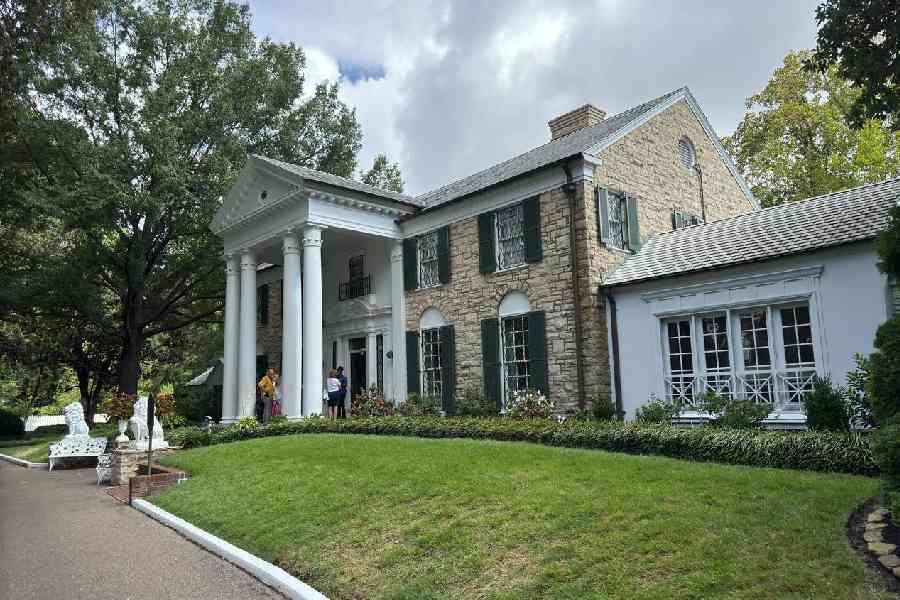By August 16, 1977, Elvis Presley had given so much that he had nothing left to give. He was the man behind classic records that have become the foundation of modern pop music, a leader of a cultural revolution that he never could fathom and a stage performer few could measure up to.
Even during his final years, all he had to do was simply walk up to the stage to collect bagfuls of applause, even if that involved grinning that irresistible grin or adjusting his belt while scattering a few of his musical gems. Turned into an island guarded by bodyguards and sycophants, he was desperate to escape the mystique of his own presence and glass-bowl existence. He eventually succeeded in leaving his Memphis home called Graceland.
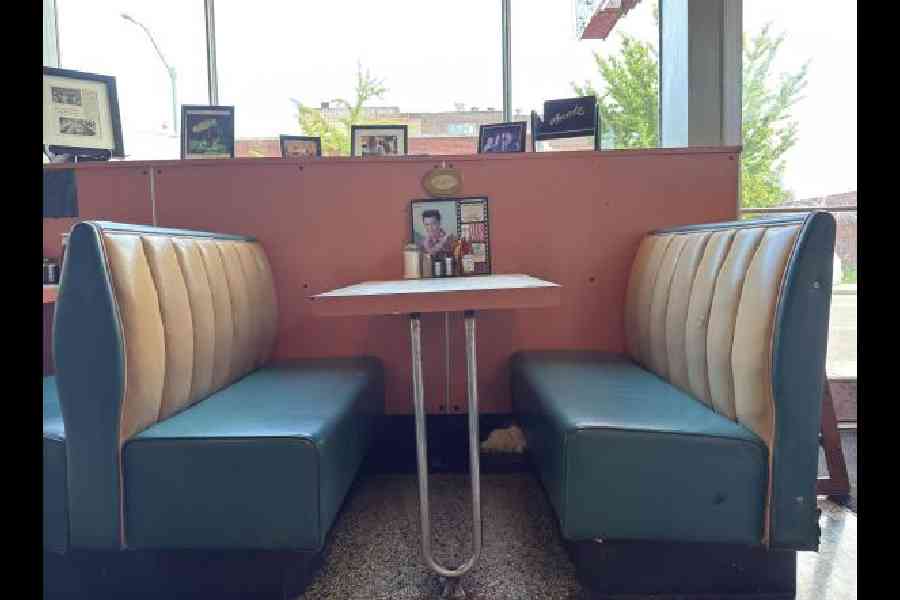
The Arcade is the oldest restaurant in Memphis. Elvis Presley was a regular here (his favourite zone in the restaurant seen in the picture) and it has been featured in numerous movies: The Client, The Firm and Walk the Line
Yet, even after all these years, fans of Elvis can’t help but remember those evergreen lyrics “We’re caught in a trap/ I can’t walk out” while waiting to enter Graceland, like I did a few weeks ago.
An early morning ride from Hotel Napoleon — with a stop at The Arcade restaurant — took me to 3764 Elvis Presley Blvd. Weekend or otherwise, the queue to Graceland is never short, no wonder it still attracts 600,000 visitors each year. Making the visit special is an important date waiting around the corner — January 8, 2025 marks the 90th birthday of the man. Had luck and health favoured, the world may have seen a nonagenarian Elvis going hunk-a hunk-a burning love. We can blame his obnoxious manager ‘Colonel’ Tom Parker. We can blame his lifestyle. We can blame his boredom. Perhaps it was just a series of bad dinners of art and commerce that got to him. He lost track of what was the main course and what was dessert.
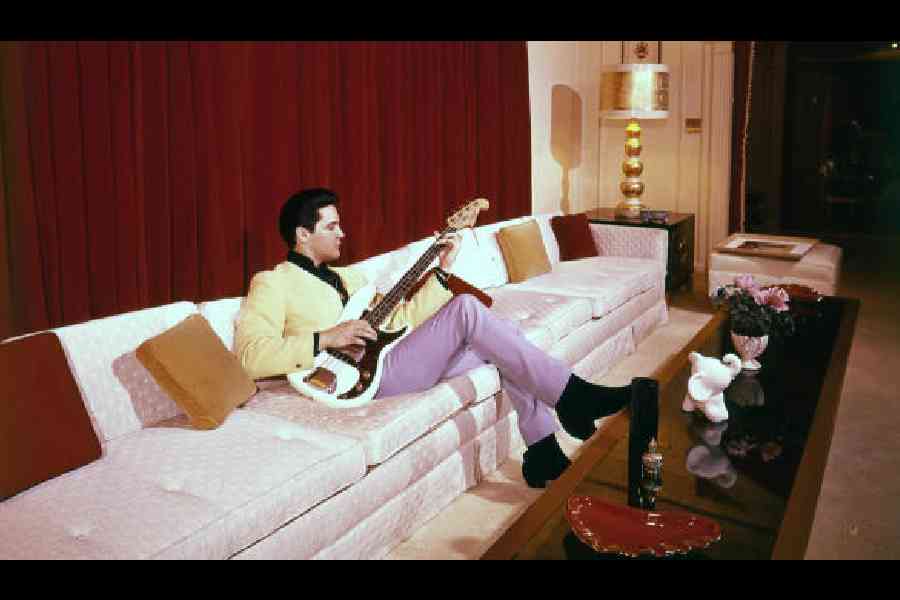
Elvis at home in Graceland in 1965
In a way, Elvis and Marlon Brando represented what author and lecturer Pauline Kale called “a contemporary version of free American”. Both icons were primitive, physical and intuitive and both championed rebellion. The similarities between them cannot be missed — they both endured years of trashy work at approximately the same time and then Brando returned with a vengeance while Presley returned with equal success before surrendering once more to indifference.
The fact remains, he never played to an unsold seat. His recorded voice has been heard by more people than by any other performer. His motion pictures were box-office triumphs (despite some of the storylines), racking up impressive figures on the strength of his name alone. He was a raw talent from America’s Southern backwoods, who changed the course of popular music and culture.
Shammi de Elvis
Many Indians, who are now on the wrong side of 40, were spoon-fed Elvis by their parents in the 1980s. The television was the most sought-after member in the family while limited programming meant Shammi Kapoor films and videos surfacing every other week. Be it videos to songs like Dil deke dekho, Aaja aaja main hoon pyar tera, O haseena zulfonwali or Aaj kal tere mere pyar ke charche, he went all jiggy like Elvis to win our hearts.
Around 2004, I had an opportunity to chitchat with Kapoor about his take on the Internet and what it meant for the Indian youth. The conversation couldn’t help but veer towards Elvis for a couple of minutes during which his voice went all jiggy, speaking of the Memphis man.
Elvis touched hearts and minds of movie stars and musicians all over the world. No, the man was more than just music — he was a package deal. He taught generations to dance and future rock stars to swing the microphone like a boss and not just sing into it. He lived and played for the screaming crowds.
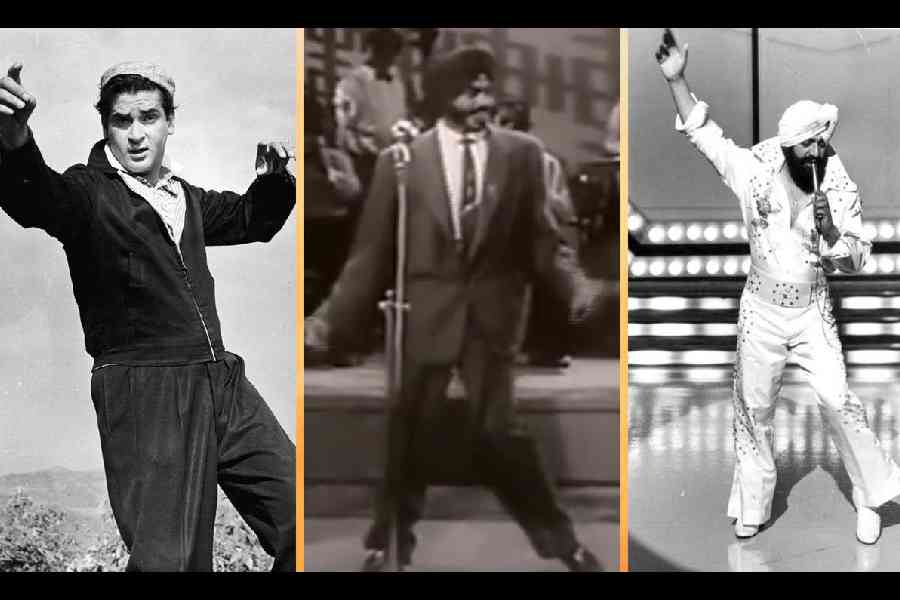
(Left to right) Shammi Kapoor, Iqbal Singh Sethi (aka ‘Elvis in a Turban’) and Narinder Singh (aka the ‘Rocking Sikh’)
In the 1980s, I don’t remember sitting/eating maachh-bhaat through a single episode of Lunchtime Variety or Musical Band Box on All India Radio without listening to Elvis hits like Can’t Help Falling In Love, All Shook Up and Pledging My Love.
I even remember visiting Symphony in New Market in the early 1980s with my father to pick up Bruce Springsteen’s Born in the U.S.A. LP and being privy to a long conversation my ol’ man had about how Elvis influenced The Boss. Or the moment my English teacher, the late Dipak Robson, broke into a superb version of Wooden Heart and (Let Me Be Your) Teddy Bear while talking about how Elvis and his family attended the Assembly of God Church in Memphis.
Etched in my memory is the moment when Sunil Dutt ambled into the TV frame in a restaurant to see the late Iqbal Singh Sethi — aka ‘Elvis in a Turban’ — sing and dance to A Beautiful Baby of Broadway in the 1960 film Ek Phool Char Kaante. Turban in place, he danced as if he had just seen Elvis dancing to Don’t Be Cruel.
It would be remiss on my part to not mention reading about Narinder Singh, who became known as the ‘Rocking Sikh’. Popular as Peter Singh, he is a brilliant example of how the King spread joy. In the UK, Singh appeared on TV shows like Pebble Mill and Naya Zindagi Naya Jeevan (Asian community programme). But I like him for his Bhindi Bhaji Boogie. Born in 1946, his family moved to Britain when he was nine. The man was also partial towards Cliff Richard.
Another part of my early memory of Presley involved his name coming up in conversations between my father and grandfather at the dinner table around 1983 (or ’84). This was when the Left Front government was in full bloom in Bengal and though I had no understanding of politics then, the late RSP leader Jatin Chakraborty’s name came up again and again with adjectives as colourful as the dinner table would allow. The man had placed a ban on performances of Usha Uthup in government auditoriums he had control over because of “apasanskriti” though he had no definition of the term. The conversation was around an interview the politician had given in which he was asked if he had ever listened to Western music. Two names came up — Pat Boone and Presley.
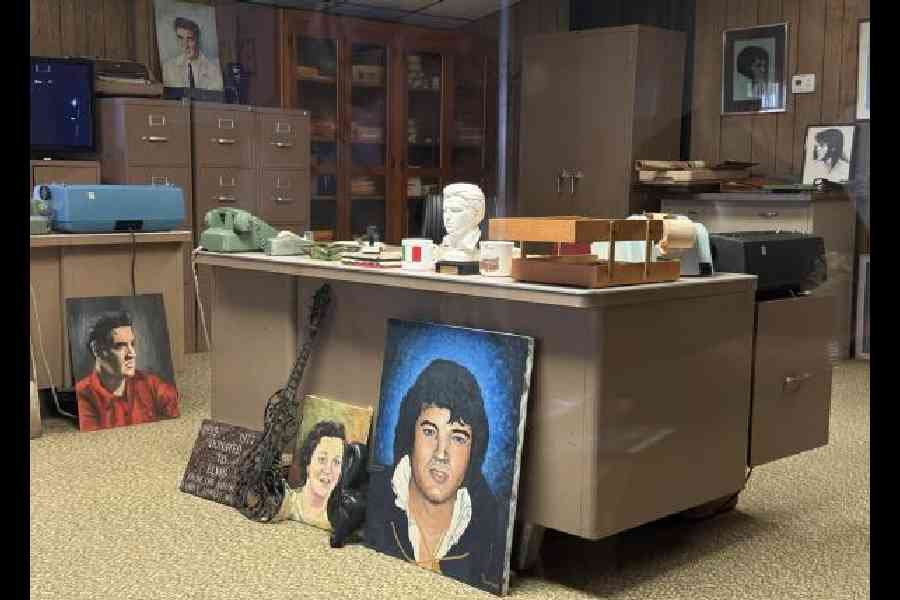
Vernon Presley’s office out the back, behind the mansion, where he also lived
Going through the phases
So to be in Memphis, drinking in the sights and sounds of Sun Studios, Stax Museum of American Soul Music and having breakfast at The Arcade was what Hugh Grant would have described as “very weird. It’s the sort of thing that happens in dreams not in real life. I mean good dreams”. If former Japanese prime minister Junichiro Koizumi could do an Elvis Presley impression during a tour of Graceland years ago, why couldn’t I thrust my muffin-top waist going “Loovve mee tenderrr”. I have always known that I love Elvis but only at Graceland could I feel the degree.
And why wouldn’t I? He was the greatest rock singer, the greatest ballad singer, the greatest romantic singer. He was… nah-nah… is the King.
He carefully nurtured an era that declared that you can do whatever you like (except, of course, “step on my blue suede shoes”). Even today, the kickoff of his Hawaii concert is spoken about — you can imagine hearing Also Sprach Zarathustra and the drums. You can imagine the man standing on the stage like a bullfighter, legs spread while his left knee vibrated to the beat.
His hold on the popular consciousness went beyond mere records; it ran deep into generational and sexual politics, the lure of Hollywood and even a dark side of the American dream.
There were three phases to his short life — the young, lustful rockabilly cat delivering songs like Good Rockin’ Tonight, Hound Dog and Baby Let’s Play House, then came the slick but slowly disastrous Hollywood career and then the big comeback as well as “after picture” of a bloated crooner.
Blessed with preternatural good looks, he exuded carnal charisma during his 1956 appearance on The Ed Sullivan Show, causing a sensation because of his sexy gyrations. The censors at CBS insisted that the singer be shot from the waist up.
It was the time when he delivered songs like Any Way You Want Me, I Was The One, My Baby Left Me, Lawdy Miss Clawdy and Paralysed. These were the songs that inspired a new generation of musicians — John Lennon famously said, “Without Elvis, there would be no Beatles”, Bruce Springsteen said, “When I heard Hound Dog, it just shot straight through to my brain” while Post Malone went to the extent of tattooing Presley’s face on one of his fingers.
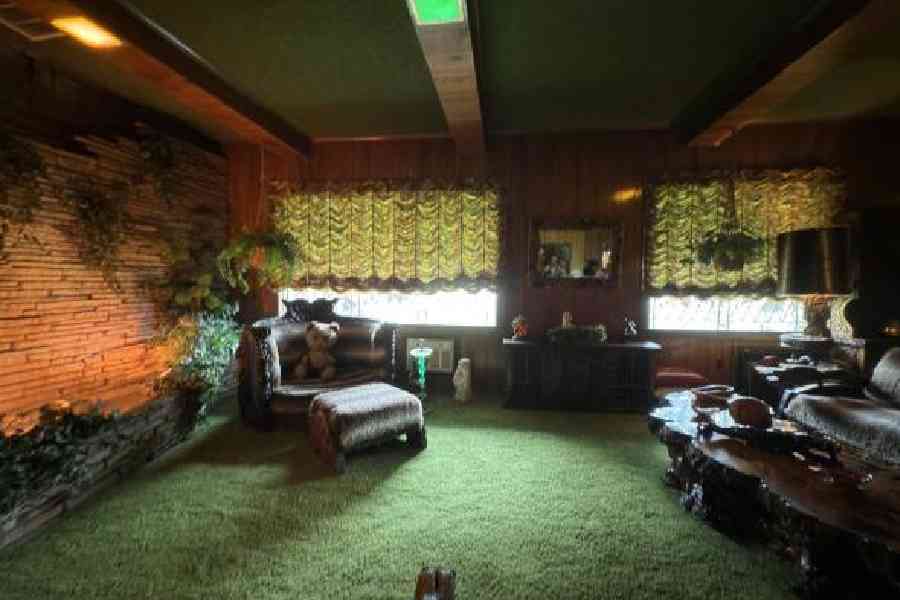
After Graceland opened for tours, the media nicknamed the “den”, The Jungle Room. Originally this area was a porch at the back of the house, thus the stone wall. Elvis enclosed it and made it a room in the mid-1960s. As a little girl, Lisa Marie Presley would sometimes curl up in the big chair for a nap Picture: Mathures Paul
Agreed that the classic version of rock ’n’ roll doesn’t exist the way it once did, perhaps because younger audiences are less interested in it. Yet, Presley commands respect on streaming services.
According to statistics from Luminate Entertainment Data, the organisation that provides data for the Billboard charts, between 2020 and 2022 Presley ranked in the mid-200s for overall streams. Except for Frank Sinatra, he was the oldest artiste on these charts, a testament to his enduring popularity.
Helping the Presley wave has been Baz Luhrmann’s lavish 2022 biopic, starring Austin Butler as the King and Tom Hanks as Colonel Tom Parker. It presented the idea of how Presley shook up society by ignoring racial boundaries and sexual conventions.
The soundtrack is a testament to his music being appreciated by younger musicians. The Sun single That’s All Right becomes the foundation for a collaboration between Diplo and rapper Swan Lee, Doja Cat’s Vegas has as its bedrock Big Mama Thornton’s original Hound Dog, The King And I finds Eminem riffing on Blue Suede Shoes, Kacey Musgraves goes all in with her version of Can’t Help Falling In Love and Maneskin delivers a beautiful version of If I Can Dream.
The years of “bloated Elvis” have been mocked by many critics but the truth remains that he has sold more records in death than he did while alive. The decades since his death have allowed fans from several generations to recognise Presley’s distinct style and the inventive exuberance of his performance. Abraham Lincoln could be the most iconic American among Americans but around the world, for many, it’s Elvis Presley.
Taking care of business
Presley’s achievements cannot be contained within Graceland. He is synonymous with Memphis but if you are in Tennessee’s largest city — Nashville — you won’t be missing Presley at all because the man is everywhere, his face is plastered on walls and is an integral part of the music scene there. Be it Memphis or Nashville, moolah will be rolling out of your pocket if you go on a Presley trail and it’s worth every dollar.
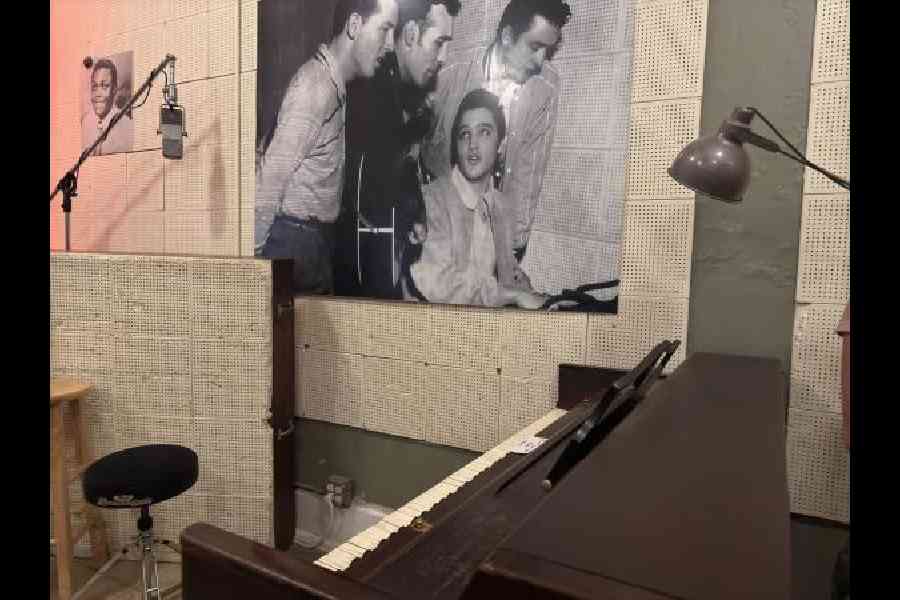
The Million Dollar Quartet Piano is a vintage Wurlitzer spinet. The piano, unsurprisingly, features on many of the classic 1950s releases from Sun Records. But it gets its name because, in December 1956, it was used on the Million Dollar Quartet Session. What’s that? It is the name given to recordings made on Tuesday December 4, 1956, in the Sun Record Studios in Memphis. The recordings were of an impromptu jam session between Elvis Presley, Jerry Lee Lewis, Carl Perkins, and Johnny Cash
The King is a thrill for the millions who flock to Memphis. For music and Presley fans, a visit to Sun Studio is mandatory — the two-story brick building is a Memphis pilgrimage. Opened by rock-and-roll pioneer Sam Phillips at 706 Union Avenue, this is where Presley was discovered by the record producer’s secretary Marion Keisker. Ultimately, Phillips recorded the future King of Rock ’n’ Roll’s first single, That’s All Right, in 1954, but he was also a blues fan and recorded other legends, including Howlin’ Wolf and the Prisonaires.
At Sun Studio you can feel the presence of Presley, Jerry Lee Lewis, Carl Perkins, Johnny Cash, Roy Orbison, Howlin’ Wolf and B.B. King. You just can’t ignore this place or the thrill of holding the original Shure 55-series microphone used by many of the legendary musicians… yes, their sweat could be on that device.
Had Presley been around, he would have assured us that there is more to Memphis than his Cadillac collection, like the Stax Museum of American Soul Music.
The original Stax Studio was demolished in 1989 (it’s a story for another edition), but in 2003, the Stax Museum of American Soul Music was created as the first museum dedicated to soul music. Presley had a strong connection to Stax Studio. In 1973, he visited the studio — started by the brother-sister duo of Estelle Axton and Jim Stewart — to create music.
Presley was basking in the glory of the 1972 concert documentary Elvis on Tour, which would go on to win a Golden Globe Award, and 1973 kicked off with a bang, with the massive success of his Aloha from Hawaii via Satellite special. He spent the first half of the year touring and needed to record music for RCA but he didn’t feel like returning to Nashville or Los Angeles at the moment. So he decided to give Stax a try, a 10-minute drive from Graceland. It resulted in a number of important recordings, like Promised Land, It’s Midnight, I Got a Feeling in My Body and If You Talk in Your Sleep.
It’s been more than 70 years since Presley’s momentous sessions at Sun Records but his empire is not in need of a financial reboot... at least not for the time being. It continues to pull in millions of dollars, be it through tours or memorabilia sales.
Consider the Forbes list of top-earning dead stars from 2016 — Presley had an immensely strong showing by earning $27 million and selling one million albums. Yes, the figures may have changed slightly since then but the sheen and glory are very much there.
Today, Presley’s estate is estimated to be worth several hundred million dollars, defying all odds. Brands are expected to lose their sheen as they get older because the older generation goes away but the King’s estate is keeping the ball rolling. It took a lot of hard work to reach this point.
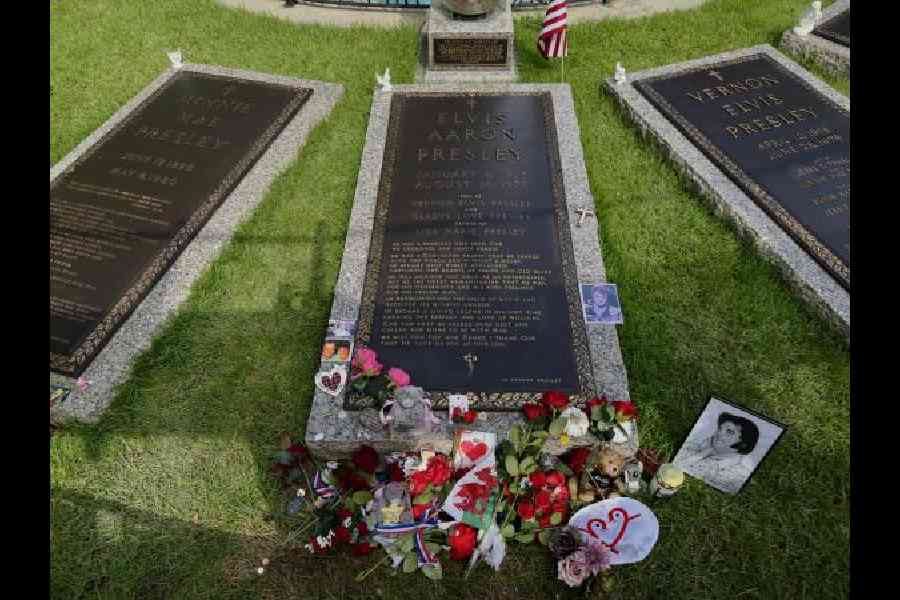
Meditation Garden is where Elvis Presley and members of his family have been laid to rest. Millions of fans from around the world have come to Graceland to pay their respects to the family
In 1973, his manager, “Colonel” Tom Parker, arranged for Presley to sell royalties for his entire back catalogue to that point for a flat $5.4 million. He thought touring would bring in more money. The estate was headed for a disastrous period.
Nonetheless, his estate’s fortunes changed when Priscilla Presley took charge and opened Graceland to the public in 1982. Fans suddenly had access to the main floor of the King’s home, plus his cars. The winning formula continues to win, and has withstood obstacles even like the one that was thrown at it earlier this year — a company claimed the estate failed to repay a loan that used the property as collateral, and ultimately law had to step in to block an auction (in August, federal authorities arrested a woman for allegedly trying to defraud the family and steal the family’s ownership interest in Graceland).
Money is also made by the many Memphis establishments while keeping Presley in mind, like The Arcade, one of the city’s oldest restaurant where the singer had his corner.
His truth keeps marching
Graceland, in some ways, is a reminder of the tragic last few years of Presley’s life. And if that wasn’t enough, the estate had to deal with further heartbreaks. Last year, the singer’s daughter Lisa Marie died and was buried on the estate. Equally heartbreaking is the grave next to her’s — of her son Benjamin Keough who died by suicide in 2020. Less than six months before her own death, she wrote about grieving his loss, saying that it had “destroyed” her but that she kept going for the sake of her three daughters.
Elvis Presley flashed his famous grin for 42 years and it’s ironic that Graceland has also been open to the public for 42 years. “Without reintroduction, we forget who Julius Caesar is,” musician Chris Isaak once said. “Doesn’t matter how great you were in your moment, you will be forgotten. All things fade.”
So how is Graceland coping with this fact? Stories and connections. Instead of just saying he is the King of Rock ’n’ Roll, show the world what he achieved and at what age. Here was this 18-year-old, who didn’t have straight As in high school but he tried to make something for himself. Isn’t that the story a young musician wants to hear? Someone like Justin Bieber perhaps. Presley is now being presented as an iconic American story.

Lisa Marie Presley and her son, Benjamin Keough, graves in Graceland
The lights dimmed long ago on Presley’s stage. But we remember him standing with legs parted, his head bowed, his arms overstretched, wearing a beautiful cape as the audience rose to their feet, tears flowing, trying to hold back the man. Being born into the age of television, we can still see his life in a glance — from a rebellion to an ageing King in his isolation.
In death, or if you prefer retirement, Presley has become a monumental figure and perhaps no singer would come close to winning the hearts and minds of not just Americans but of millions beyond his country of birth, changing the destiny of pop and rock music.
A few among us wiped away tears as they stood in front of the graves at Graceland. It’s a reminder that people are aware of his excesses and weaknesses but also a life lesson from the King — a kid, who couldn’t stay still and wasn’t rich, conquered the world. And so can our children.
Graceland facts
⇓ The Graceland complex in Memphis, which includes an exhibition centre, attracts more than 600,000 visitors annually.
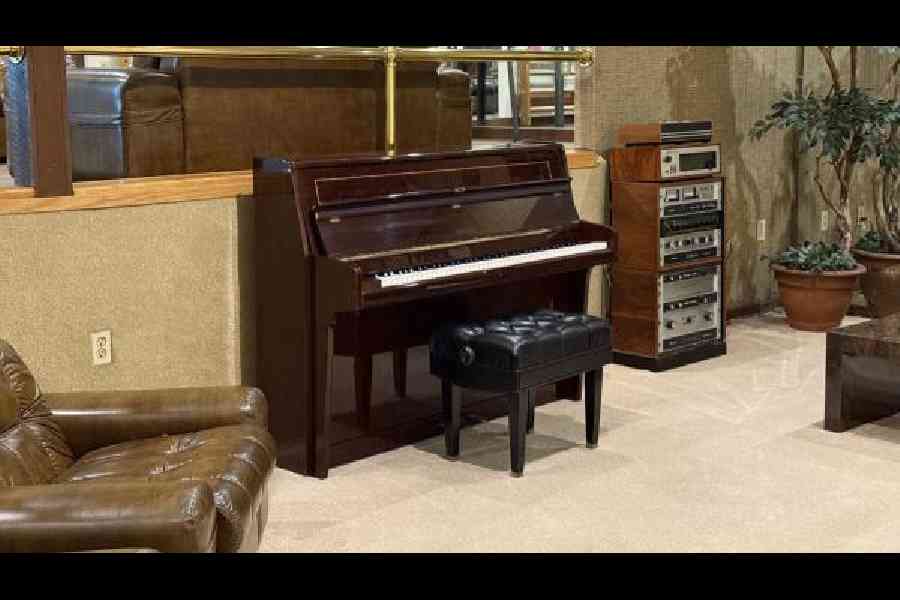
The lounge of the racquetball room was built in the backyard
⇓ Elvis Presley bought the property in 1957, when he was 22. He died in 1977 at the age of 42 and is buried on the Graceland property.
⇓ Graceland opened to the public in 1982. Three thousand fans walked in.
⇓ Graceland was built in 1939 by Thomas Moore and his wife. The house was named after Mrs Moore’s aunt Grace Toof, the original landowner.
Marketing lessons from Elvis
⇓ Build your unique brand: The message Elvis Presley sent out when he was alive was simple — anybody can achieve success. In death, the message remains.
⇓ Go for the throat: Presley was happy singing his golden hits but he threw in two-three new numbers in every other concert. He played the right songs at the right tempo.
⇓ Think global and local: Elvis Presley Enterprises comes up with merchandise for different target groups, making the Presley brand distinctive.
⇓ Sell one story, not a million: His message was simple — live performances connect with the audience while an album is like a “business card”, enticing you to attend a concert.
⇓ Showmanship works. He had a great voice but so do many other musicians. Instead of diluting his music to sell more records, he kept his vocals left, right and centre while trying new genres.
⇓ Don’t be afraid to take chances: His first hit, That’s All Right Mama, sounded unique and so did Heartbreak Hotel, Hound Dog and Don’t Be Cruel. Take the initiative to expand your job duties, like he expanded his style.
By the number
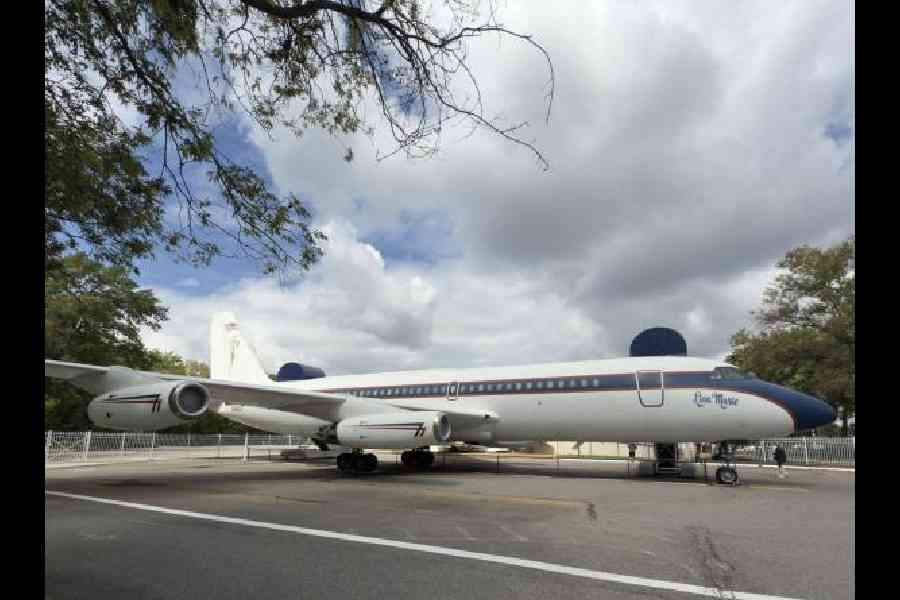
Presley’s touring jet, The Lisa Marie
1+ billion: Elvis Presley records have been sold worldwide.
40 per cent: That’s the estimate of Elvis Presley records that have been sold outside the US.
80 weeks: His number one singles spent a total of 80 weeks at number one. More than 90 Elvis Presley records reached the charts. These figures are only for the pop charts and only in America.
149 songs: He had no less than 149 songs appear on Billboard’s Hot 100 Pop Chart in America. Of these, 114 were in the top 40, 40 were in the top 10, and 18 went to number one.
150 albums: In America alone, Presley has had 150 different albums and singles that have been certified gold, platinum or multi-platinum by the Recording Industry Association of America (RIAA), with more certifications expected as research into his past record sales continues and as current sales go on.
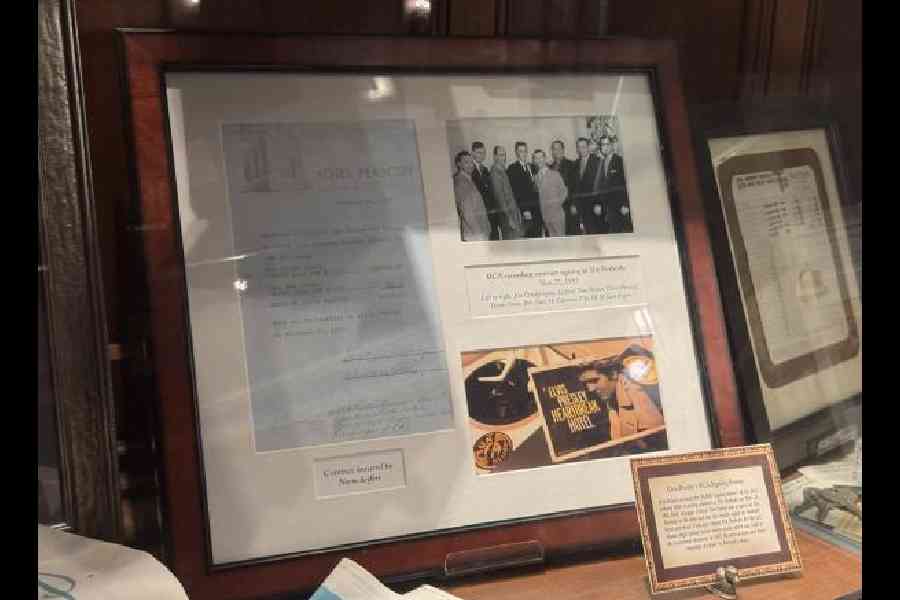
In November 1955, Elvis Presley signed his first recording contract with RCA in the lobby of the grand Peabody Hotel, receiving $4,500 as part of his $6,000 signing bonus. The time had come for his manager Colonel Parker, a master illusionist, to orchestrate the career of one of the greatest singers ever
Plan your Elvis tour of Memphis
Put aside at least two days during a visit to Memphis. Besides all things Elvis Presley, find time to visit National Civil Rights Museum, located at the historic Lorraine Motel where Martin Luther King Jr was assassinated in 1968. For more information, visit Memphis Travel’s website (www.memphistravel.com).
⇓ Graceland: The home of Presley. It will take you four-five hours to explore the place.
⇓ Stax Museum of American Soul Music: This is where soul music resides. Presley had a famous recording session at Stax studio in the 1970s.
⇓ Sun Studio: Presley made his first recording here. Touch the microphone used by some legendary singers.
⇓ The Peabody Hotel: Presley signed his first recording contract with RCA in the lobby of the hotel. You can stay back to watch the Peabody ducks waddle.
⇓ The Arcade: It is the oldest restaurant in Memphis and Presley was no stranger to the place
⇓ Explore Beale Street: The road was popular with the King.

